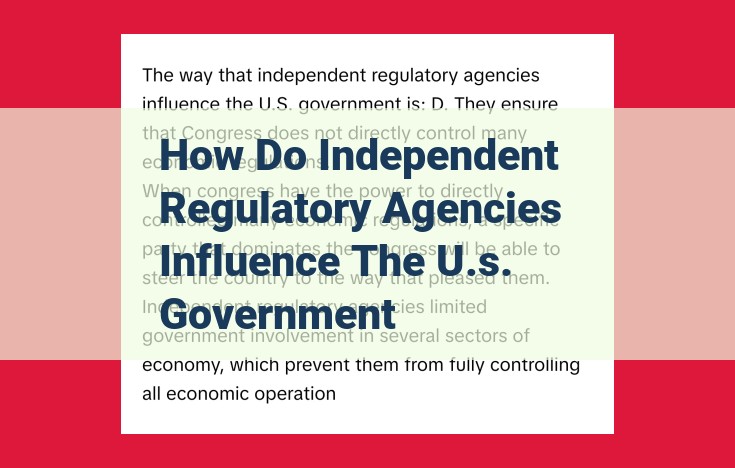Independent regulatory agencies wield significant influence over the U.S. government by exercising regulatory authority over specific industries and sectors. They set policies, enforce laws, and provide oversight, shaping the behavior of businesses and protecting the interests of the public. These agencies act independently of the executive branch, providing checks and balances and ensuring impartial regulation.
Understanding Regulatory Agencies: A Guide to Key Players – Federal Reserve System
The Federal Reserve System: Guardian of the Monetary Realm
As the central bank of the United States, the Federal Reserve holds a paramount position in regulating our economic system. Its overarching mission is to maintain monetary stability, ensuring that the value of the dollar and the stability of the financial system are preserved.
At the heart of the Federal Reserve’s role lies its control over monetary policy. By adjusting interest rates, it can influence the amount of money available in the economy. Low interest rates stimulate borrowing and investment, while higher rates can slow down economic growth to curb rising prices.
Another critical function of the Federal Reserve is supervising banks. It ensures that banks operate soundly and prudently, minimizing the risk of financial crises. Through inspections and examinations, the Federal Reserve monitors banks’ financial health, capital adequacy, and compliance with regulations.
Key Responsibilities of the Federal Reserve:
- Setting interest rates to manage inflation and promote economic growth
- Supervising banks to ensure financial stability
- Managing the nation’s money supply
- Regulating credit and lending
By safeguarding the health and stability of our monetary system, the Federal Reserve plays a vital role in supporting economic prosperity and preventing financial meltdowns. Its decisions impact not only businesses and investors but also every individual who uses a dollar bill.
The Securities and Exchange Commission: Guardians of the Securities Industry
In the realm of finance, where every move can impact the lives of millions, there stands a steadfast watchdog: the Securities and Exchange Commission (SEC). Its mission is paramount: to protect investors, ensure fair markets, and prevent financial fraud.
The SEC’s reach extends across the vast landscape of the securities industry, from the bustling trading floors of Wall Street to the cozy offices of small-town brokerages. It has the formidable task of regulating the sale, purchase, and distribution of _stocks, bonds, mutual funds, and other securities.
One of the SEC’s key responsibilities is protecting investors from those who seek to exploit them. It does this by enforcing _disclosure laws, which require companies to provide investors with accurate and timely information about their financial health and operations. By shedding light on such details, the SEC empowers investors to make informed decisions about their investments.
Furthermore, the SEC is the overseer of stock exchanges, such as the _New York Stock Exchange and NASDAQ. It sets and enforces rules to ensure fair trading practices, prevent insider trading, and maintain the integrity of the markets. By doing so, the SEC creates a level playing field where investors have confidence in the fairness and transparency of the process.
The SEC’s mandate extends beyond enforcement. It also plays a vital role in _educating investors about the risks and rewards of investing. Through its website, publications, and outreach programs, the SEC empowers individuals to take control of their financial future.
In a world where the wheels of finance spin relentlessly, the SEC serves as an indispensable guardian, safeguarding the interests of investors and ensuring the integrity of the securities markets. Its vigilance and dedication are the cornerstones of a healthy financial system that fosters growth and prosperity for all.
Commodity Futures Trading Commission (CFTC) (10): Examination of the CFTC’s role in regulating futures and options trading, protecting against market manipulation, and ensuring fair competition.
Understanding the Commodity Futures Trading Commission (CFTC)
In the realm of financial regulation, the Commodity Futures Trading Commission (CFTC) plays a pivotal role in safeguarding the integrity and fairness of futures and options markets. Established in 1974, the CFTC’s mission is to ensure that these markets operate transparently, efficiently, and free from manipulation.
One of the core functions of the CFTC is to regulate the trading of futures and options contracts. These contracts allow buyers and sellers to hedge against future price fluctuations or speculate on future market movements. By overseeing these markets, the CFTC protects investors from potential fraud and abuse.
The CFTC also has a crucial role in ensuring fair competition in the futures and options markets. It enforces anti-manipulation rules to prevent individuals or entities from artificially influencing prices or creating false or misleading market signals. This promotes a level playing field for all participants.
In recent years, the CFTC has expanded its focus to include the regulation of digital assets, such as Bitcoin and Ethereum. As these assets gain increasing traction, the CFTC is working to ensure that they are traded in a fair and orderly manner.
The CFTC is an essential agency that plays a vital role in maintaining the stability and integrity of the financial system. Its diligent efforts help to protect investors, promote competition, and foster a fair and transparent marketplace for futures and options trading.
The Nuclear Regulatory Commission: Ensuring Nuclear Energy Safety
In the realm of modern technology, harnessing nuclear energy holds immense potential. However, its safe and responsible use demands a vigilant watchdog: The Nuclear Regulatory Commission (NRC). This esteemed agency shoulders the critical mission of regulating the use of nuclear energy, safeguarding public health, and protecting the environment.
Ensuring Safety at Nuclear Facilities
The NRC’s primary mandate is to ensure the safety of nuclear power plants and other facilities. Through rigorous inspections, reviews, and enforcement actions, the agency oversees every aspect of these facilities, including design, construction, operation, and maintenance. It sets stringent standards for radiation protection, waste management, and emergency preparedness.
Protecting the Public from Radiation
Beyond nuclear power plants, the NRC also regulates the use of nuclear materials in various industries, such as medicine and research. It establishes limits for radiation exposure and enforces measures to minimize public exposure to harmful radiation. This includes overseeing the transportation, storage, and disposal of radioactive waste.
Enhancing Public Confidence
The NRC recognizes that public trust is paramount in the safe and responsible use of nuclear energy. To foster transparency and accountability, the agency engages with the public through open meetings, public hearings, and educational outreach programs. It provides regular updates on nuclear safety, addressing concerns and fostering an informed understanding of this complex field.
International Collaboration
The NRC collaborates with international organizations and regulatory bodies to share best practices, learn from global experiences, and contribute to the advancement of nuclear safety worldwide. It participates in international forums, sharing its expertise and supporting the development of harmonized safety standards.
The Nuclear Regulatory Commission stands as an unwavering sentinel, safeguarding the public from the potential risks of nuclear energy while harnessing its transformative potential. By ensuring the safe operation of nuclear facilities, regulating radiation exposure, and fostering public confidence, the NRC plays a vital role in shaping a future where nuclear energy serves as a responsible and sustainable source of power.
In the realm of telecommunications and broadcasting, the Federal Communications Commission (FCC) reigns supreme. This regulatory behemoth holds the keys to the vast radio spectrum, the invisible highway that carries our voices, data, and entertainment.
The FCC’s mission is to ensure that all Americans have equitable access to communication services. It allocates the radio spectrum, dividing it into bands for different uses, including mobile phones, television, and radio broadcasts. This intricate balancing act ensures that our airwaves are teeming with diverse voices and essential information.
Guardians of Competition and Innovation
The FCC also plays a pivotal role in promoting competition in the telecommunications industry. By enforcing antitrust laws, it prevents monopolies and fosters a level playing field. This competition breeds innovation and drives down prices, empowering consumers with more affordable and high-quality services.
Protecting Consumers in the Digital Age
As technology rapidly evolves, the FCC remains vigilant in protecting consumers from unfair practices. It safeguards against network neutrality violations by ensuring that internet service providers do not discriminate against certain websites or applications. The FCC also fights against spam, robocalls, and other forms of digital harassment.
Empowering Rural America
The FCC recognizes the importance of connecting every corner of America to the benefits of modern communication. Its programs and policies aim to expand broadband access to rural and underserved areas, bridging the digital divide and ensuring that all citizens have equal opportunities in the digital age.
A Vital Part of the Communications Landscape
The FCC is not just a regulatory agency; it is the guardian of our airwaves and the champion of fair competition. Its work touches every aspect of our lives, from the phones we use to the shows we watch. As technology continues to advance, the FCC will undoubtedly remain a vital player in shaping the future of communication in America.
Federal Trade Commission (FTC): Shielding Consumers from Unfair and Deceptive Practices
The Federal Trade Commission (FTC) stands as a watchdog for American consumers, safeguarding their interests against unfair and deceptive trade practices. This vigilant agency has a vast mandate, extending from antitrust enforcement to consumer protection, leaving no stone unturned in its quest to protect the rights of individuals in the marketplace.
The FTC’s primary mission is to prevent businesses from engaging in deceptive or unfair practices. This includes cracking down on false advertising, misleading claims, and predatory lending schemes. The agency also works to maintain fair competition, ensuring that businesses do not engage in anti-competitive practices that stifle innovation and harm consumers.
Notable Victories
Over the years, the FTC has achieved significant victories in protecting consumers. In 2019, the agency took action against Equifax after a massive data breach that exposed the personal information of millions of Americans. The FTC settlement required Equifax to pay $700 million and establish a $300 million fund to compensate victims.
Another notable case involved the pharmaceutical company Martin Shkreli, who raised the price of a life-saving drug by 5,000%. The FTC sued Shkreli for anti-competitive practices, forcing him to lower the drug’s price.
Consumer Education
Beyond its enforcement efforts, the FTC also plays a crucial role in educating consumers about their rights and responsibilities in the marketplace. The agency provides a wealth of resources on its website, including tips on avoiding scams, identifying deceptive advertising, and exercising consumer rights.
The Federal Trade Commission stands as a vital protector of American consumers, ensuring fair and transparent practices in the marketplace. Through its vigilant oversight, the FTC safeguards individuals from unfair and deceptive tactics, fostering a competitive environment that benefits all.
Consumer Financial Protection Bureau (CFPB) (9): Overview of the CFPB’s mission to regulate the financial products and services industry, protecting consumers from predatory lending and ensuring fair credit practices.
Consumer Financial Protection Bureau: Guardian of Financial Fairness
In the intricate world of finance, where complex products and practices can bewilder consumers, the Consumer Financial Protection Bureau (CFPB) stands as a beacon of protection. Established after the 2008 financial crisis, the CFPB serves as a relentless watchdog, safeguarding the rights of everyday Americans in the realm of financial products and services.
Mission and Mandate
The CFPB’s primary mission is to ensure a fair, transparent, and competitive financial marketplace. It has the authority to regulate all major financial institutions and products, including banks, credit unions, payday lenders, and mortgage companies. Its multifaceted mandate includes:
- Protecting consumers from predatory lending and illegal practices.
- Enforcing fair credit practices, ensuring equal access to credit.
- Providing financial education and resources to empower consumers.
Predatory Lending: A Battle Against Exploitation
Predatory lending practices often target low-income and vulnerable populations, leading to financial distress and long-term consequences. The CFPB fights tooth and nail against these exploitative practices, including:
- Unfair interest rates and fees
- Deceptive marketing and advertising
- Discriminatory lending policies
By cracking down on lenders who engage in such behavior, the CFPB shields consumers from financial traps and promotes fair competition in the lending market.
Fair Credit Practices: Leveling the Playing Field
Access to credit is crucial for individuals and families to achieve financial stability. The CFPB ensures that consumers can obtain credit fairly and responsibly. It does this by:
- Enforcing the Equal Credit Opportunity Act, prohibiting discrimination based on race, gender, religion, and other protected characteristics.
- Promoting transparent and accurate credit reporting, protecting consumers from errors that could impact their credit scores.
- Educating consumers about their credit rights and obligations.
Financial Education: Empowering Consumers
Knowledge is power, especially in the financial arena. The CFPB provides a wealth of educational resources and tools to help consumers understand their financial rights, make informed decisions, and avoid financial pitfalls. Its website offers:
- Comprehensive guides on credit, mortgages, loans, and more
- Interactive tools for budgeting, debt management, and identity theft prevention
- Free credit counseling services
The Consumer Financial Protection Bureau is an indispensable player in the financial landscape, protecting consumers from predatory practices, ensuring fair credit access, and empowering them with financial literacy. By being a fierce advocate for everyday Americans, the CFPB contributes to a more transparent, just, and equitable financial system for all.
Understanding the Federal Energy Regulatory Commission: Regulating the Flow of Energy
In the intricate world of energy regulation, the Federal Energy Regulatory Commission (FERC) stands as a key player. Established in 1977, FERC’s mission is to ensure the可靠 and efficient transmission and sale of electricity and natural gas across interstate lines. With a vast mandate, FERC plays a pivotal role in shaping the energy landscape of the United States.
Setting Rates for Energy Transmission
FERC holds the authority to set rates for the transmission of electricity and natural gas over interstate pipelines. This responsibility is critical as it impacts the cost of energy for consumers and businesses nationwide. FERC’s rate-setting process involves a thorough analysis of the costs incurred by transmission companies while ensuring reasonable profits. By balancing these factors, FERC aims to create a stable and competitive energy market.
Promoting Competition in Energy Markets
FERC diligently works to foster competition in energy markets. It monitors mergers and acquisitions within the energy industry to prevent the formation of monopolies. By encouraging competition, FERC helps keep energy prices competitive and accessible for all.
Ensuring Reliability of Energy Infrastructure
Reliability, a cornerstone of FERC’s mission, pertains to the ability of the nation’s energy infrastructure to meet demand. FERC closely monitors the operation of the electric grid and natural gas pipelines, working with energy companies to prevent outages and ensure adequate supplies of energy. The commission also develops and implements standards for the construction and maintenance of energy infrastructure, minimizing the risk of failures and potential disruptions.
In summary, the Federal Energy Regulatory Commission is a vital agency that shapes the energy landscape of the United States. Its responsibilities encompass rate-setting, promoting competition, and ensuring the reliability of energy infrastructure. Through its diligent efforts, FERC helps ensure a secure, efficient, and affordable energy system for the nation.
The Guardians of Fair Competition: Uncovering the Department of Justice’s Antitrust Division
Within the labyrinthine corridors of the Department of Justice, a specialized force stands sentinel, safeguarding the integrity of the American marketplace: the Antitrust Division. Charged with the formidable task of enforcing antitrust laws, this division wields its authority like a double-edged sword, protecting consumers from the clutches of monopolies and ensuring a level playing field for businesses.
Preventing Monopolies: A Bastion Against Market Dominance
Monopolies, the giants who seek to control entire industries, cast a long shadow over competition. The Antitrust Division acts as a vigilant watchdog, combating mergers and acquisitions that threaten to concentrate market power in the hands of a few. By scrutinizing these transactions, the division ensures that consumers continue to benefit from diverse choices and competitive pricing.
Promoting Fair Competition: Nurturing a Thriving Marketplace
Fair competition is the lifeblood of a healthy economy. The Antitrust Division fosters this competitive spirit by investigating and prosecuting anti-competitive conduct, such as price-fixing, bid-rigging, and boycotts. These practices stifle innovation, raise prices for consumers, and suffocate the growth of small businesses.
Examples of the Antitrust Division’s Impact
The division’s impact is felt far and wide. It broke up Standard Oil in 1911, dismantling the massive monopoly that controlled the oil industry. More recently, it blocked AT&T’s proposed merger with T-Mobile in 2011, preserving competition in the telecommunications sector. These victories have safeguarded the interests of consumers and businesses alike.
The Department of Justice’s Antitrust Division is a cornerstone of the American economic system. Its unwavering commitment to enforcing antitrust laws ensures that fair competition prevails, protecting consumers from the perils of monopolies and fostering a vibrant marketplace for businesses. By upholding the principles of competition, the division plays a vital role in safeguarding the integrity of our economy and the well-being of our nation.
Delving into the Realm of Regulatory Oversight: A Closer Look at the Office of Information and Regulatory Affairs
In the labyrinthine world of federal regulations, one entity stands out as the orchestrator of a cohesive regulatory framework: the Office of Information and Regulatory Affairs (OIRA). This little-known but highly influential agency plays a pivotal role in ensuring that the nation’s regulations are necessary, cost-effective, and aligned with the priorities of the executive branch.
Central to OIRA’s mission is its function as the gatekeeper of federal regulations. Before any new regulation can be implemented, it must undergo a rigorous review by OIRA. This process involves assessing the regulation’s necessity, scrutinizing its economic impact, and ensuring its consistency with existing policies. By acting as a quality control filter, OIRA prevents unnecessary or unduly burdensome regulations from burdening businesses and individuals.
Furthermore, OIRA collaborates with other agencies to coordinate regulatory efforts and minimize duplication. This collaborative approach ensures that the various regulatory bodies work in tandem, utilizing resources efficiently and avoiding conflicting mandates. By fostering a spirit of cooperation, OIRA helps streamline the regulatory landscape, reducing the potential for regulatory overreach.
The work of OIRA touches all aspects of American life, from protecting consumers and promoting economic growth to safeguarding the environment and ensuring public safety. Its nuanced approach to regulatory oversight balances the need for effective regulation with the importance of preserving individual liberty and economic vitality. By striking this delicate balance, OIRA plays a vital role in shaping the contours of our nation’s regulatory framework.




